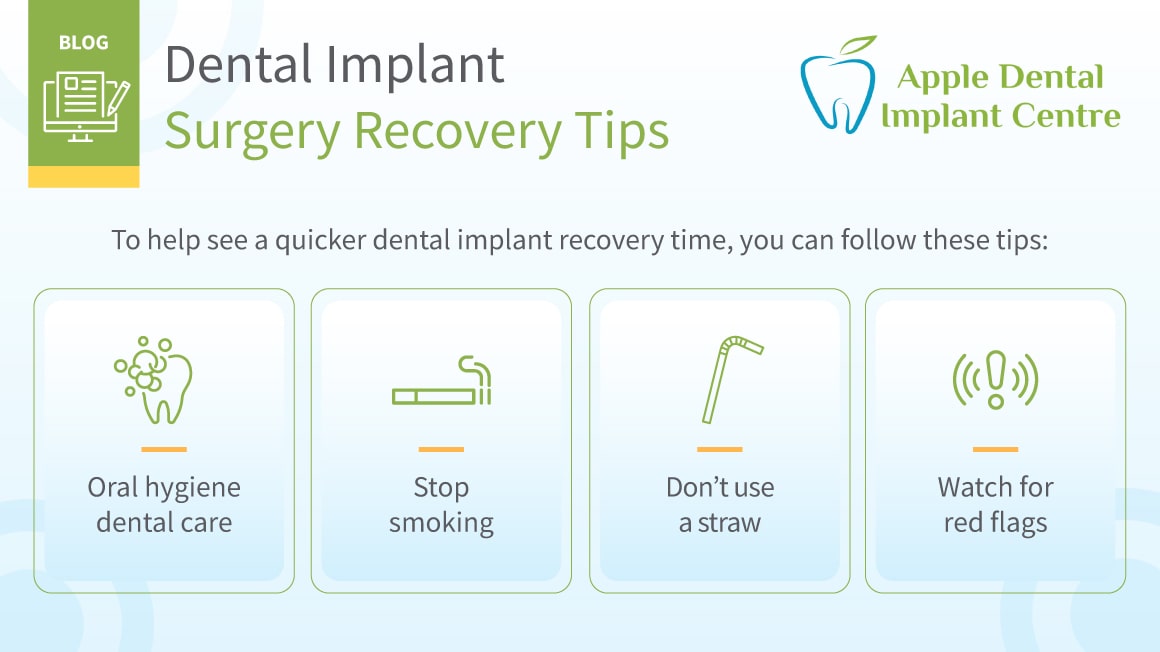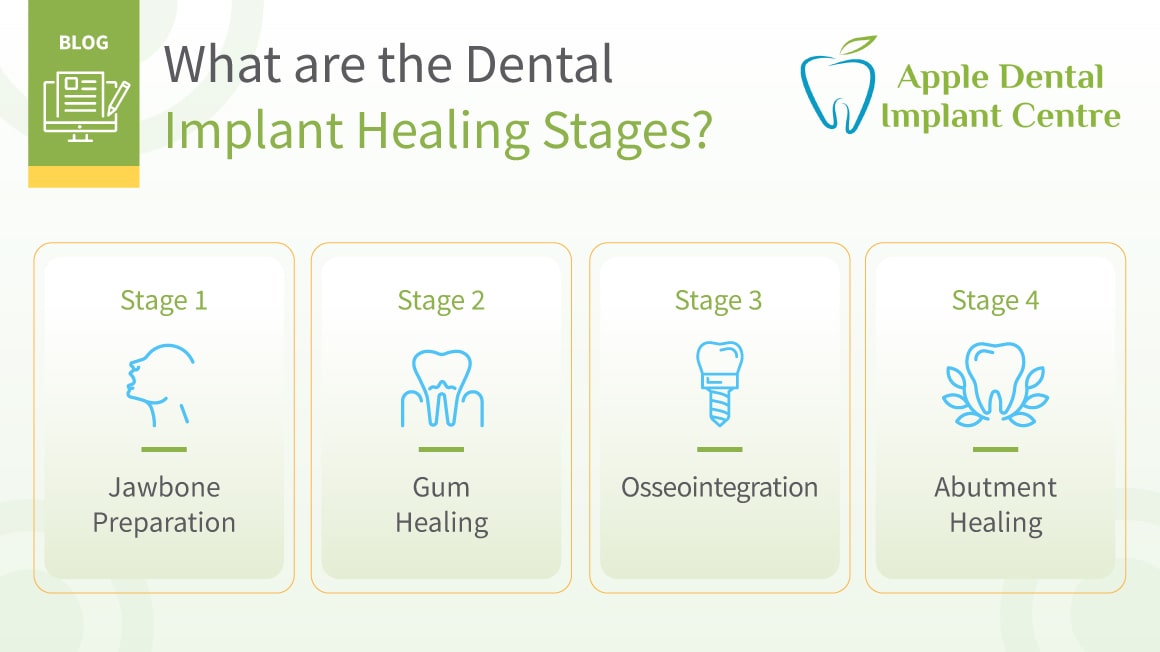Share this
Dental Implant Healing Stages: Everything You Need to Know
by Apple Dental Implant Centre on (February 20, 2023)
If you’ve decided to proceed with dental implants, you’re probably wondering what to expect throughout the process. To help prepare for your surgery, we’ve outlined everything you need to know about the steps of your dental implant treatment and the dental implant healing stages between each step. We also share essential dental implant surgery recovery tips to help you start enjoying your new smile sooner.
Why are There Many Stages for Dental Implant Healing?
Dental implants are hands down the best tooth replacement solution to match the look and feel of your natural teeth. Unlike any other tooth replacement treatment, implants simulate your natural tooth root, providing the same stability, chewing, bite and overall function right down to the bone stimulation required for bone health and growth. Your implants give you both perfect, natural-looking teeth and proper tooth support for life. Because implants involve several steps, your dentist waits for optimum healing at each stage before moving on to the next step. In fact, there are four possible steps involved in dental implant procedures:
Step 1: Possible Bone & Gum Preparation
Dental implants require stable bone and healthy gum tissue to be successful. At your initial consultation, your dentist will assess your bone and gum health to determine if you require treatment to prepare for the procedure. These treatments require a lengthy healing process before your dentist can begin your actual dental implant procedure.
Step 2: Dental Implant Placement
Your dental implant procedure requires an incision in your gums so your dentist can drill small holes drilled in your jawbone for your posts. The posts are made of a “biocompatible” metal called titanium which actually fuses to the jawbone through “osseointegration.” Time is required for your gums to heal and osseointegration to take place.
Step 3: Surgery to Place the Abutment
Placing the abutment requires the reopening of your gum to attach the abutment to the post. The abutment is exposed above the gum, providing the “screw” to affix your new teeth. This procedure requires time for the gum to heal before proceeding to the final step.
Step 4: Placing Your Artificial Tooth
Placing your artificial teeth is the final stage of your dental implant procedure. If all goes well at this stage, your gums are healed, your posts are fused to your jawbone, and your dentist can insert your new teeth.
What are the Dental Implant Healing Stages?
The entire dental implant process takes from six to 12 months and involves the following healing stages:
Stage 1: Jawbone Preparation
If your dentist recommends a bone graft to support your implants, the initial healing takes about two weeks. But for the transplanted bone to see enough growth to support your implants, you’re likely looking at three to nine months before your dentist schedules the first step of your implant procedure.
Stage 2: Gum Healing
The small incisions made in your gums are sutured and packed with gauze once the posts are in place. The incisions take about two weeks to heal, as long as you follow your dentist’s aftercare instructions.
Stage 3: Osseointegration
Your bone also needs time to heal following your dental implant surgery. Osseointegration can take from two to nine months for the jawbone and post to fuse together and create a stable “root” for your artificial teeth. Your dentist will continue to monitor your progress before scheduling your abutment insertion appointment.
Stage 4: Abutment Healing
Following the placement of your abutments, your gums will need time to heal. Your gums can feel more sensitive at this stage, as the abutment sits above the gum tissue so you can see and feel it. It can take from two weeks to a month for your gums to heal.
During the final healing stage, your new teeth are fabricated at an offsite laboratory which usually takes another two weeks. Once your dentist confirms everything is healed, they will affix your crowns or dentures to the abutment -- no healing time required.
What Should You Expect When Healing from Dental Implants?
Although it can take up to six months or longer for your dental implants to completely heal and fuse to the jawbone, the first two weeks require the most care. Here’s what you can expect during your implant healing process:
The First 24 Hours
The sedation and numbing agents used during surgery will help keep you comfortable but will slowly begin to wear off. Your implants will be packed with gauze to reduce bleeding and help blood clots form. To help with the clotting process, you can bite down on the gauze, and within a few hours, most of the bleeding should die down. As the effects of the numbing wear off, the discomfort or pain becomes noticeable.
Aftercare: Be sure to fill any prescriptions your dentist provides right away, as your painkillers will most likely be required your first night. You should also apply ice packs to your cheek at the site of the implant to help reduce discomfort. To give yourself time to recover, plan to take a sick day following your surgery, as you should avoid physical activity for at least 24 hours to reduce the risk of increased bleeding.
For the first three or four days, you’ll be on a strict soft, bland “warm” food diet and should be drinking plenty of fluids. This is the one day your dentist lets you get away without brushing and flossing.
Days 1 - 3
In the first three days, the pain and discomfort peak, and swelling becomes more noticeable. By day 2, the bleeding should be over, and by day 3, the pain will begin to fade. The good news is you will continue to feel better each day. The bad news is you still have to eat soft food and stick to reduced activity levels to help avoid bleeding or damaging the blood clots. Be very careful brushing the teeth surrounding the implants as well.
Aftercare: Start gently rinsing the site three times a day with a mild, non-alcohol-based mouthwash or warm salt water. Do not gargle. Depending on whether you have a single, multiple, or full mouth replacement, your dentist will instruct you on whether you can brush or floss.
Days 3 - 7
This is a day to celebrate as you should be able to start introducing more foods to your diet like pasta. Keep up your liquid intake and avoid hard foods for at least another week. You can increase physical activity but keep it toned down.
Aftercare: Avoid brushing the dental implant area but keep rinsing and brushing your other teeth.
Week 1
Your dentist will likely schedule a follow-up appointment to see how you are progressing. If your sutures haven’t dissolved, they will remove them. You should start feeling much better after a week, so it is likely your dentist will also tell you it’s okay to start eating your regular diet sans anything too chewy or hard. If your implants are all on one side, chew on the “good side,” especially when eating something harder or tougher.
Aftercare: At this point in the recovery process, your dentist will most likely give you the okay to start brushing and flossing your implants and show you how to do it properly.
Week 2
If all goes well, you should be fully recovered, despite some tenderness at the implant site. You’re looking at a good 3 to 6 months of healing time before you are fully recovered from your procedure. If things haven’t progressed as your dentist hoped at your week 1 checkup, they will request another follow-up for week 2.

Dental Implant Surgery Recovery Tips
To help see a quicker dental implant recovery time, you can follow these tips:
- Oral hygiene dental care: Follow rinse instructions and avoid flossing or brushing at the surgical site until your dentist gives you the thumbs up.
- Stop smoking: Smoking can increase bleeding, so don’t smoke for at least 21 days after your surgery.
- Don’t use a straw: Using a straw can cause issues with your sutures and blood clots, so sip on your drinks instead.
- Watch for red flags: If you experience fever, severe pain, uncontrolled bleeding, or warm swelling past the three- or four-day mark, call your dentist right away. They will assess your implants to determine if there is an issue with the healing.
Apple Dental Implant Centers in B.C. offer affordable dental implant treatments with no-obligation consultations to discuss your options. Reach out to our team today to learn more or schedule an appointment.


